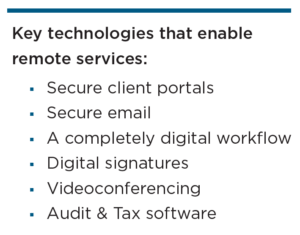Frank T. Ardito, CPA
Vice President & Director
So far, 2020 has thrown many curve balls at the business community due to the Covid-19 pandemic, not the least of which is the shift to remote service delivery for some companies, including accounting firms like ours.
Where face-to-face meetings and the ability to hand documents back and forth across a table were an unquestioned part of client relationships before Covid, now we meet by videoconference and upload documents to the cloud.
Remote services have been working their way into client relationships for several years as cloud-based technology has made service delivery faster and more efficient. But the Covid crisis has accelerated the trend, with largely positive results. Clients appreciate the ease and efficiency of remote services, and the array of technology solutions that facilitate remote services is growing rapidly.
Remote services are here to stay for clients who appreciate the convenience, and in the audit space that means preparing for changes in delivery of documentation and communication with your audit team.
Remote vs. onsite audit
When a financial statement audit is performed onsite our audit staff visits your office for two to five days to gather data, perform tests of transactions and substantive work, assemble documentation and ask questions when clarification is needed on data and processes. Once this fieldwork is complete, the remaining audit services are performed at our office. 
When an audit is performed remotely, the fieldwork phase occurs digitally with financial documentation and related materials exchanged via a secure client portal and secure emails, with audit staff asking questions by email, videoconferencing or phone. Videoconferencing with screen share capability and secure digital signatures are additional technologies that support the remote audit and tax process.
Communication essential
A traditional onsite audit typically starts with a planning meeting at which the clients provide auditors with information they will need for the audit. For remote audits, those questions can be put into an Excel file and uploaded as a questionnaire to the client via a web portal or a secure email, along with testing templates.
The advance questionnaire is a time saver for both the client and auditors. But it diminishes the amount of personal contact you have with your audit firm, which may impact the level of trust and comfort you should have with professionals who can guide you when problems arise.
That’s why we provide a detailed communication plan as part of the remote audit plan. You don’t want to trade off communication for expediency.
A good communication plan includes the contact information for everyone on both sides – the client’s staff and the audit firm team. It also should include a schedule of regular phone calls or emails for a progress report.
A communication plan also calls for one to two videoconference calls, one at the beginning of the audit and one at the end, to discuss findings and recommendations.
Growth in remote work
Another trend that was already under way but has been accelerated by the Covid crisis is remote work. As we have discovered during the pandemic shutdown, the remote service delivery model complements the work-from-home trend very well.
Professionals who now work from home fulltime cannot come into the office just to host the visiting audit staff during fieldwork, so remote audit services provide the solution.
However, for those who come in a couple days a week and prefer some onsite fieldwork, G.T. Reilly has developed a hybrid model whereby we limit onsite work to one or two days per engagement, provided the client adheres to strict Covid-19 safety guidelines. This model is for those who might have issues getting us certain information electronically. The balance of our fieldwork is done remotely.
A related trend that is now emerging — corporate downsizing in the post-Covid era — may accelerate remote service delivery as a model for the future. Commercial real estate trends around the country — including in Boston — indicate that companies will downsize their physical space as many employees opt to work from home permanently. This will mean fewer “spare” offices and conference rooms available to host external auditors.
Embracing change
All these trends point to the likelihood that remote delivery of audit, tax and consulting services is here to stay long after Covid is gone. The challenge both for auditors and clients is to maintain the close working relationships and sense of trust that are facilitated by in-person contact.
Ultimately, the shift toward remote services for audit, tax and consulting projects may come down to your organization’s ability to adapt to change. For now, remote service delivery is required as the Covid crisis continues. But in the future remote services of all kinds — not just accounting, audit and tax — will likely be the norm.
If you have questions about implementing remote service delivery in your company, contact us.



